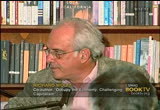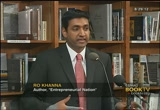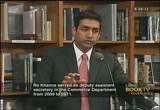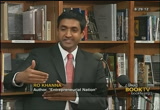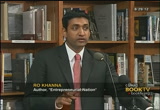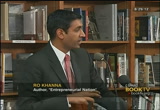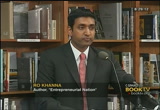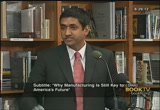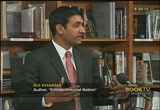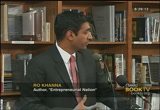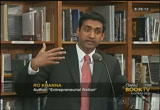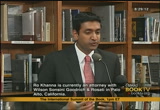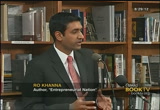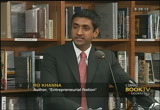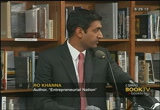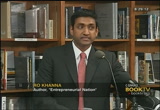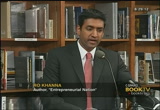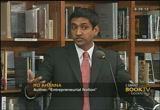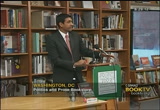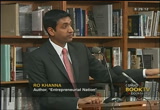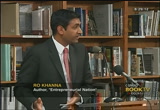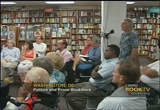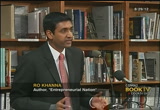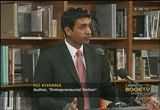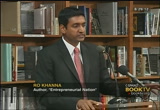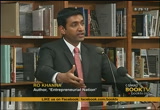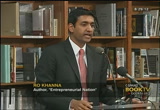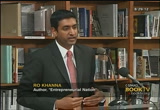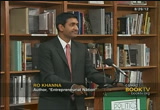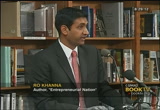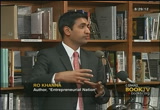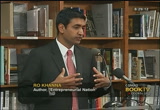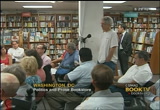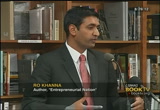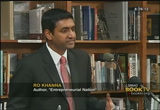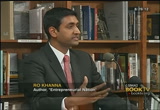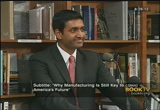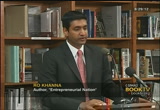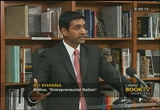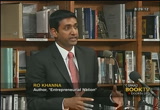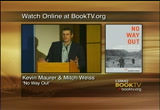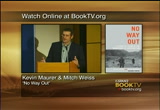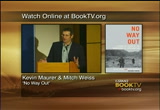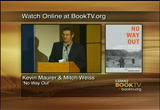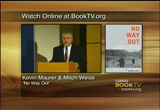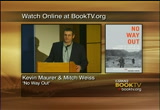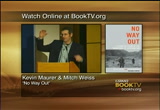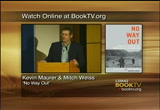tv Book TV CSPAN December 29, 2012 12:00pm-1:00pm EST
12:00 pm
12:01 pm
>> now, on c-span2, we bring you booktv. on this holiday weekend, booktv extended the programming until wednesday, january 2, at 8 a.m. eastern. first in the program to watch for this weekend. a few events from international summit of the books. five panels look at the future of publishing. sunday, watch a couple of interviews from the university of pennsylvania. fishesz, at 1 p.m., we talk with john l. jackson, jr., the unintended consequences of political correctness. at 1:30, we hear about "after broadcast news: media regime, democracy, and the new media information environment." watch these programs and more all weekend long on booktv. visit booktv.org for a complete schedule.
12:02 pm
next on booktv, the former deputy assistant secretary of commerce argues that the u.s. is and will continue to be a leader in manufacturing and innovation. it's about 45 minutes. ♪ >> thank you. thank you for the very kind introduction. it's a real honor to be at politics and prose, such an institution to the city, and it's really a pleasure to be here. thank you to everyone for coming out on an august evening to hear me. i will try to be brief in my comments, and i would rather have more of an exchange of ideas and hear your perspective and so that we can have a conversation about manufacturing and what our country should do to be competitive. the book, the idea for the book came above when i was traveling around the country, and i would go, and i would see a successful
12:03 pm
manufacturer making blenders, making steel, making fire stones, making meats, and food, and i would say, you know, i thought all of our manufacturing had gone offshore, something didn't make sense. i started to wonder what were people missing in this story? it turns out that while a lot of consumer manufacturing has gone offshore, so if you go into a store, the toys there, apparel there, a lot of that has left america. we still are a world leader when it comes to complex, advanced manufacturing. we make almost 80% of our steel here. we make tremendous amount of planes here, and we're neck-and-neck in manufacturing with china. now, that is a staggering statistic. we make 20% of the world's goods
12:04 pm
with about 10% of our economy. china makes about 20% of the world's goods with 40% of its economy. we are neck-and-neck as a manufacturer, and it's due to a six-time productivity advantage that we enjoy over china when it comes to manufacturing, and we even have a productivity advantage over countries like japan and germany, countries thought of as manufacturing leaders. i wondered, and i started asking myself, well, what is it that gives us this productivity advantage? what is it that gives american manufacturers this ability to compete? i wanted to go and talk to rail manufacturers because one of the things that when you're in washington and in bureaucracies, you know, you have a lot of people pontificating about the state of american manufacturing and what we need to do without
12:05 pm
actually engaging and talking to manufacturers, and, particularly, not talking to small and medium-sized manufacturers. the large manufacturers, the ceos, are often represented on policy think tanks, but the reality is almost half of the manufacturing jobs are with small and medium sized businesses. i decided that i wanted to talk to some of these small and medium sized businesses and figure out what it was that was givenning them a comparative advantage, and one of the arguments i made in the book is our entrepreneurial culture that allows us to have the advantage. i don't mean the entrepreneur at the top, the steve jobs model or the great industrialists. what i mean is that companies that do well in the manufacturing space listen to the ideas of their employees,
12:06 pm
and are encouraging employees to come up with efficiencies this production to figure out how to assemble things more efficiently or how to make products that are more innovative, and they are soliciting those ideas. here is where i think a lot of the traditional critique on manufacturing misses the mark. robert rice, who makes the argument that there's knowledge worth -- people like lawyers, my profession, doctors, bankers, who are knowledge workers, and then there's manufacturers, and they completely miss the idea of modern manufacturing. modern manufacturing requires a lot of knowledge. these are people who are thinkers, who are innovating, and lawyers, i tell you, require a lot of repetitive work. people who say lawyers, you know, we draft documents, templates, and it's repettive. distinction is artificial, and the best manufacturers that i met were really listening to the ideas. let me give you two concrete
12:07 pm
examples. i talked about 15 in the book, and one is blenders, and i was shocked to learn that the blenders that make your frappicinos, i drink of lot of frappicinos, are all made, for the most part in the united states. when i realized that, i realized why i paid four bucks for the frappicinos. i talked to jodi berg, a brilliant woman, about why is it you're able to make blenders in the united states and sell them to the specialty coffee shops? jodi explained that the specialty coffee shops have very specified requirements for what nay want out much their blenders. one, they don't want any noise. why? because you go to a barnes and folk -- barnes & noble, and there's a star bucks there, and if the
12:08 pm
blenders make noise, you don't linger there and go into the store, so they want to make sure there's absolutely no noise in the blender. secondly, for those of you who enjoy frappicinos, you know, you don't want ice chips in there. they have to ensure the blenders crush the ice chips properly, and so what joy di was able to do was work for the specialty coffee shops on the design of the blenders that they wanted. that is a very difficult process to outsource. i mean, you can imagine if you were in china or in brazil trying to figure out how to design something with the customer and interacting with them would be very complicated so the customization of products that small and medium manufacturer les do is inherently possible to do in the united states, and it was not just joy di engaged in this, but her employees coming up with
12:09 pm
ideas about what to do to make the blender better. a second example is globe manufacturing. globe was one of the most inspiring stories in the book. it is a manufacturing existing since 1887, and they make fire suits, and after 9/11 when the pentagon was attacked and they needed fire companies to put out that fire, they had different companies come from the virginia area and the dc area, and they noticed that only the companies that were wearing the fire suits were able to work through the night and deal with the pathogens and extremities that were in the pentagon building. one of the people, the commander in the pentagon, called up rob freeze, who was the owner of globe fire suits said we need 300 fire suits here tomorrow. rob said, what's the sizes? i don't know, figure out how to
12:10 pm
get them here. rob freeze, the small company in new hampshire of about 300 people assembled fire suits, and rob was the only one allowed to take a mercy flight after 9/11, the only one allowed in the air space, delivered the fire suits, and the firefighters used them to put out the fire in the pentagon. it's a story about patriotism, but it's more than that. i wanted to know, well, what is it that allowed globe fire suits to still have comparative advantages, and one of the biggest insights for globe fire suits came in a production efficiency. they are able to make fire suits much cheaper than a lot of their foreign competitors, and the idea, which i go into detail in the book came from one of the employees on the assembly line who said that if you use a smaller size needle than a larger sized needle, you're actually going to make smaller holes b and it's going to save fabric which saves clothe.
12:11 pm
it was an idea submitted in a suggestion box that led to the innovation, and, again, showed this sort of culture of listening to the employees. the second part of the globe that was unique was the way they would innovate the sensors and type of equipment on fire suits that helped fight extremities didn't come from ph.d. scientists. in fact, the guy who was doing a lot of the tinkering didn't have a college degree so often there's a sense of, well, we need stem education, and, absolutely, i think we do, but we shouldn't underestimate this sense of practical skill that are often passed down from generation, the people of fire who actually are doing things on the factory floor that account for a lot of globe's most successful innovation when it comes to fire suits.
12:12 pm
one of the pieces, as i said, is that our democratic culture in the business world gives us this competitive advantage of o more authoritarian manufacturing structure, particularly small and medium sized businesses because that allows them to economize production, and that allows them to customize products. the second thesis in the book is tracing a support of manufacturing back in american history, and the idea there's always been a role for government support of private industry. going all the way back to alexander hamilton. i tell people you don't have to read the "world the flat" to understand what we have to do in a global competitive world. read alexander ham hamilton's rt on manufacturing, ten pages, and me makes the argument.
12:13 pm
he says in a world where we are competitive with other nations and other nations are setting up industries, we need to make sure that we have fair trade. we have to make sure that we are providing incentives, economic incentives for new industries, clean technology, could almost get the justification for funding -- for funding that through hamilton's argue. hamilton makes the argument that we need infrastructure and roads to support manufacturers. he makes the argument that we need the right tax incentives, and that we need a right of work force that is educated. jefferson has the view that the government needs to support manufacturing. now, this becomes the american economic system and influences henry, abraham lincoln, and is the governing philosophy of
12:14 pm
america's rise in industrialization. herbert hoover, when i got to the commerce building, and why would your name be in the commerce building, the president responsible for the depression, there's a lot of republic for hoover. he was not the best president, but a great commerce secretary. he was the secretary of commerce and under secretary of everything else, and he was working for calvin coolidge, and you know what hoover did? he believed in the american economic system, and he and calvin coolage, the apostle of limited government, poured in millions of dollars to the aviation industry which is still in wichita, kansas, funded the existence of infrastructure, and calvin coolidge, quoted in the book, talks about the importance of the investment in roads. eisenhower, of course, with the highways, and even reagan
12:15 pm
invested in the semiconductor industry, and the manufacturing extension partnership which now, some people think is irrelevant or bureaucratic was a brain child of reagan. what happened? in the last 30 years, there's a sense that government no longer should matter among some people with certain ideologies, and they argue that america should not make the mistake of becoming like europe. the information cited for their my philosophy for great american thinkers like ayn rand. the great justification for free market absolutism is not found in american history because american -- alexander hamilton
12:16 pm
said while he believes in free markets, practical politicians need to realize there are times to intervene, and we have been a nation when it comes to manufacturing that has rejected the ideologies of both the left and the right and has really dean what works, and that is really through the book. i try to advance that argument, and i think the person who sums it up the best is a columnist, richmond mcgregor from "the financial times," and there's a quote saying "america's problem is not that it does not work like china. america's problem is that it no longer works like america." i think what he means by that is we don't need to copy a system of government in china or brazil that has accepted state intervention, but we do need to remember what policies helped make us a great industrial
12:17 pm
power, and those policies, hopefully, can be adopted on a bipartisan basis like they were until our most recent history and most recent turn to what i would say is free market absolutism. i think there is a practical middle ground. the question then, and then we can get into the policy during q&a, the question that often comes up is, well, what's the hope for the future? what is the sense of america and american manufacturing, america's economy with the rise of china, with the rise of brazil, with the rise of other developing nations? one of the points i make is our nation has consistently been underestimated when it comes to our economy. in the 1950s and larry summers had made this point in the
12:18 pm
article, the paul samuelson. how many people are familiar with paul samuelson? he wrote the standard textbook in the -- where he argued that if the growth rates continue as they were, the soviet union would overtake the united states by 1985. this is one of the nobel prize -- did a lot of other things that were brilliant, but that turned out to be incorrect; then, cover article after cover article in the harvard business review predicted that america wins the cold war, but japan and germany are going to be the dominant post cold war economies. those predictions seemed rather silly in retrospect, but it is not to diminish the contribution of the skeptics. i think what the greatness of the nation is that at times of
12:19 pm
crisis, at times where things may not be fully on track, it is the skeptics who speak up and say we may lose and force us to re-examine our policies that allow us to adapt and continue to lead, and i think the same thing -- same principle is true right now. we are -- our manufacturers, particularly, small and medium sized manufacturers, are doing extraordinarily innovative things. they are customizing products. they are economizing on production. they are competing. we are neck-and-neck with china, but the growth rates are not promising. china's growing at 6% or 7%. we're growing at 1%. the last nation that lost the lead in manufacturing, can anyone guess who that was? great britain, and things didn't work out well for them afterwards. we are faced with a challenge,
12:20 pm
and the challenge is not are the american entrepreneurs and manufacturers up for it, but the challenge is are they going to get on a bipartisan basis to support their government that has existed for 200 year tradition, and the argument is we need to come together as a nation on a national security basis and on a sense of our economic competitiveness to put together a manufacturing agenda that is going to help the medium sized manufacturers make ends meet and continue to thrive in the environment where they are not getting the assistance of their government, and other foreign competitors are getting extraordinary assistance from their government. let me end on the note where i think -- which i'm most optimistic about, and i don't talk about this fully and develop it fully in the book, but coming from silicon valley, and you see the existence of technology companies in our
12:21 pm
technology advantage in which is still the case that twitter, facebook, linkedin, all the companies emerging in the united states, and what they represent, and i think the technology, the future of the united states represents is the ability to not just export and export our products and our technology, but to export our ideals, democracy -- democratic dialogue of the free flow of information, and the ability of these technology companies which are still based in the united states to have a global impact, i think, bodes well, not just for our economic future, but also for the ability of america to continue to project its ideals across the world to hopefully democracytize the flow of information which ultimately, i argue, is fundamental to the productivity and comparative advantage. thank you. with that, happy to answer
12:22 pm
questions. [applause] >> i wanted to is you what you foresee in the future of manufacturing as manufacturing changes. there could be changes with computer manufacturing, and how will the entrepreneurial advantage continue to thrive in that environment? >> excellent question. what will the role of technology be for american manufacturing. the first thing i caution people about is i don't think technology is going to replace workers, fully replace workers. john maynard keens had an article in the 1930s saying technology is progressing at such a great rate that in 20
12:23 pm
years, we're all going to be working 15-hour workweeks. now, that turned out to be completely false because what happened -- what he didn't account for is that the demand for goods would increase. i mean who would have thought back in the 1930s anyone would need an iphone? while automation reduced the need of workers on particular goods, the output increased so much that we were -- we're able to have -- we have more need for workers. that said, i think what technology enables when you have things like additive printing and robotics is an ability to continue to have a productivity advantage and efficiency advantage over other competitors, and the challenge, in my judgment in the work force is how do we prepare people to be able to use these machines? to be able to operate the
12:24 pm
machines? to be able to be -- conversant with computers and technology? that's why, i think, the investment in technology, in the internet, in broadband, in training people on that is absolutely critical to our future and the education and the specific types of education, and, finally, to the point is not diminishing the skill that these jobs required. i mean, some of my law school classmates, roommate, they say i was completely inept in making anything. ironic i wrote a book on manufacturing. i can write a brief, but i can't assemble a machine. it doesn't mean my skills is different or any better, its own market value, but somehow we
12:25 pm
frowned upon or don't appreciate the complexity of the skills required in the trade, and i think we need to both educate on technology and also have a real respect for how difficult the jobs are. >> you mentioned the importance of sustaining efforts to technology oriented education. which of our other current manufacturing facilitation initiatives do you think are really critical for us to sustain and what new initiatives would you suggest in order to stimulate our entrepreneurial success? >> great question. the partnership, a small program, but it's not well-known at the department of commerce, and what they do is they help companies figure out how to become more efficient.
12:26 pm
they figure out how to economize their production process or how to customize products, how they can find a path to profitability. you say, well, just privatize it. why can't you just have a consultant to that? the answer is ge, you pay bane rates, but not if you're a small or medium sized manufacturer that is struggling to make ends meet, and you want help on how to compete, and even hamilton, going back to hamilton, talkings about how manufacturers need help in becoming conversant in new technologies. the manufacturing partnership, woefully underfunded and has not been deployed should be supported, and other countries have five times the hem they provide their manufacturers. secondly, i think exports.
12:27 pm
i mean only 1% of our companies currently export. it's a staggering statistic, and it's not just opening markets abroad. it's also having the ability and desire to go abroad, and i think having programs that help manufacturers identify foreign markets and resources is critical. the third, i think you have to look at trade and tax policies. there is no doubt in my mind that china's policies are unfair, and not just to american workers. in my judgment, they are unfair to their own middle class. they are supporting elite exporters who have crony relationships with the regime at the expense of giving consumers access to the best products in the world, and we have to make
12:28 pm
economic fairness of the highest priority in our bilateral relationships with china, and then on tax policy, we have to look at how do we insent vise manufacturers with the right tax credits to invest in the united states? thank you. >> i wondered about obama's national export initiative, doubling them by 2014 if i'm correctly. >> i didn't plant the question. [laughter] >> so i was just wondering, first of all, what do we export? like, what would you say are the strengths where you export, and secondly, what do you think can be done by the government or other institutions in order to promote the exports that the goal can be reached? >> that's a great question. so one of the things that we export very well is planes.
12:29 pm
we export machinery, complex machinery. we export medical equipment. people are often shocked to learn, you know, what most people guess what we export, they guess weapons. that's actually not true. we are much more ideal deny istic -- idealistic as a nation. planes are less complex equipment with manufacturing. what's the challenges? exports under this administration are up about 32% over the last three years. they deserve credit, and it's also because we're coming out of a huge depression and some of the currency, one is education, and we have to have people at our manufacturers take export
12:30 pm
seriously. it used to be having an international division was a nice novelty, something international sales, if they fall in your lap, that's great, but people thought the vast majority of the markets were in the united states. well, the world changed. 95% of consumers are overseas, and we need companies to realize that, and really have international sales as part of a core part of the strategy. second is access to financing or the right tax incentives. you know, one of the challenges, when i was in wichita, their competition was basically going to be financed by the brazilian government. when they sold stuff, it was like the brazilian government gave them none. they had no access to financing here. it's politically controversial. president clinton proposed taking some t.a.r.p. money and providing financing to manufacturers, but even if we're not directly loaning companies,
12:31 pm
manufacturers money, what we can do is at least provide the right tax incentives that if they are willing to export or manufacture, that they have those incentives. the final point i'd say is there's an awful law in the world trade organization which allows companies -- countries that have indirect taxation, the value added tax, to exempt their exporters from that taxation, and if you have the corporate tax like we do, we are not allowed to exempt our manufacturers from that tax. now, we established the world trade organization at a time where we really didn't think anyone was going to compete, and we wanted to encourage other countries to build their industries, but the world has changed, and i think on a bipartisan basis, we need to push for a change in those wto, the sanction between indirect and direct taxation when it
12:32 pm
comes to tax credits for exports. sure? >> if you've come across companies that do actually export successfully in your research? >> absolutely. i talk about a number of them, and we still -- one of the companies i talked about is tucker powder. it's in alabama, and they export candy all over the world, and i described the alabama as an example of that you don't have to be on the coast to be -- to be successful at reporting, and one that they don't understand, we have a big port in alabama. they took exception with that. the point is that the -- even their pucker powder is extraordinary. they are going on trade fairs. they are going on trade missions. they are aggressive about seeing where all the candy can be sold, and they're a successful example of it. there's numerous examples.
12:33 pm
the economy -- the chilan miners, the drillers that saved their lives, and how they exported their drilling rigs to the world. the reality is, i think, that the consumers around the world, people want american goods because they tend to often be the best, the most innovative, and it's our job in government to open the markets because that's good for american business, and it's good for people around the world to have access to american technology, and i think it's the job american businesses to see the opportunities and to recognize there's still a cashe to make things made in america. thanks. >> hello, so i want to talk about the other side of exportation that you mentioned, the idea of exporting ideas. >> yes. >> and my question is how would that be done? what do you propose to set up a way to spread the ideas around
12:34 pm
the world? >> well, it's a great question. i mean, i -- i don't know how, you know, i mean, of course, during the time of communism, i was talking to one of my colleagues, steve had the idea earlier, the voice of radio and we used to have american values to transmit that through the radio, try to have leaders who are allies of ours espouse american ideals and saw ourselves as the shining city on the hill hoping that we could spread ideas. i think what the interpret does and the novel idea of the internet is it provides people with the tools and the access to information where they can discover this on their own, and having the -- fighting to make sure there's not censorship of the internet, and the walls that
12:35 pm
are censoring the free flow of information are -- it's one way to encourage open discussion, the free discussion of ideas, and so my bullishness on the american model spreading in the 21st century is part of the tool on the internet can speak and assemble themselves on the founding principles of this country. >> hi. >> yes? >> my question is a little bit complicated, a little simpler than technology. my thing is, america, what you explainedded well, america, of course, is, you know, entrepreneur, developing and everything and new ideas, which still is. i don't think we are lacking anything in that, but it's becomes afterwards i don't
12:36 pm
understand that once we have that, we develop the things, the copycats are there, anything we develop, they do it faster and easier and cheaper. our problem is how can we do that? our expenses, everything is so much, that how can we compete with them in expenses? you talked about steve jobs. he did the same thing when he was building the things, took the jobs out to the china, and that is the competition we have with china. that is how we can give them ideas, but at least either some kind of a taxation or something that if they take it from us, they lose something. that's the most difficult part of entrepreneurship, still, my idea, still good. >> your question is how can we keep mass production here when the cost advantages of tremendous in places like china. one fact, though, is that labor
12:37 pm
costs an are only about 10% of a product cost. there's a lot more that goes into it. it's also the subsidies that the chinese government is giving when they give free land, free rent. it is the currency issues, but, you know, there are several encouraging signs. one, wages are rising in china, slowly, transportation costs and fuel costs increased with the natural gas in the united states, some of the manufacturing costs and some of the alternative energy manufacturing costs are coming down. the equation is a little more balanced, and that said, you know, in the case of apple, they do the manufactures here, but in the case where they have to integrate design and production to make the new iphone, they do that stuff here, but then theyoff shore mass production which is the biggest challenge for the united states. how to get the mass production back.
12:38 pm
where -- most of the companies i focus on are either small or medium sizedded businesses. they are making niche products or interesting customized products where you can't mass produce it. you can't just offshore that to china, or they are constantly staying at the front of the innovation curve. one of the companies named one, two, three, that i deal with says they basically have an agreement with china saying that they will give them all the old technology to satisfy the joint venture agreement as long as they don't have to give them their newest latest technology. they are basically giving them intellectual property that's anything but the most recent, and so i think the pressure on the united states will be to continually stay ahead of the innovation curve until we get fairer trade policies in places like china. >> i think that it is also every
12:39 pm
american's responsibility that they should be aware of that and, for example, to buy the goods here if we are. we have to blame the public also for that. for example, i was really -- martin luther king's statue recently put there, can you believe it was made in china? it'sing? so close to you, and things are made, even the flag you get made in china. public is responsible and how can you change that also? >> well, yeah, i think there's a local manufacturing movement in many cities where you see people wanting to buy from their local stores and their environmental reasons, supporting local business, and so i think there's a culture aspect to it, but i fundamentally think we have to get the economics to work because while we need the pride, i agree with you, and i think we have to have the right economic incentives for -- to sustain manufacturing in the long term. yes, sir?
12:40 pm
>> it seems to me there's two forces that are opposing things you'd like to achieve here. one of them is that the rise over the last 40 years of financing people and large corporations, the finance people replaced the manufacturing people in leadership so the people that lead our corporations don't have -- they are not the engineers that used to make things, and the finance people, and that's where a lot of growth in the economy has been in the finance sector too. the insentives here, seem to me, always towards bigness. for instance, the most recent egregious example of that is the financial crisis that was partly responsive. the banks, they were all too big to fail, and our response to it is to sell the failing banks to the biggest banks so the banks that were too big to fail are
12:41 pm
now bigger. how do you oppose this because these are now the most powerful forces in our economy, and probably our politics? >> well, it's an excellent question. i cite a statistic, i don't remember it off the top of my head, but in the book, i think a third of harvard graduates are going into finance, and, certainly, the undergraduate class, and there are not that many people currently going into manufacturing. partly, i think, there is a misperception in the country about how many good paying manufacturing jobs and careers are still available, and manufacturing jobs pay about 20% more on average than service sector jobs, even when you combine the finance industry, and i think we have to do a better job of articulating the opportunities that exist in the
12:42 pm
manufacturing sector because there's so much misinformation about manufacturing having gone offshore and manufacturing being environmentally unsafe, and we have to, i think, recognize leaders in manufacturing, and i mean, one of the things, if anything that the book does is it sort of tries to hold these people who are making things up as a model of something that should be celebrated, and a a lot of these manufacturers, you know, they are -- they are obviously running businesses, and they want to be profitable, but that's not what was motivating them. i mean, they have a pride of making something that is meaningful, and they dedicated their lives to that, and the more we can extol their story through microphone, i mean, i tried to do it in the book, the presence of it, the political leaders, the media does it, and holds them up as role models, the more the culture people will
12:43 pm
see those are careers worth going into. in terms of the financial sector, you know, i mean, i don't think that, you know, i don't think that we can dmiz -- dismiss the financial sector, and economists point out directly in service exports, america has a surplus so when you look with china, we have a $6 billion surplus when it comes to exporting services, and a huge deficit when it comes to manufacturing. so the -- the finance done correctly which is figuring out how to mamp capital with good -- match capital with good ideas is important and having complex innovations in that is important for america's system. the problem is short termism, short term thinking, where finance comes come in and bankrupt companies for short term gain rather than thinking what's the viable, long term model of a long term rate of return? i think that has to do with corporate governance laws for
12:44 pm
incentives and structures that don't require -- that incentivize managers to make long term decisions rather than maximizing just the quarterly shareholders' profits. >> did you see the incentives that could be changed to emphasize smallness rather than bigness? >> absolutely, and i thinking the -- a lot of the department of commerce is programmed to help small and medium sized businesses. there is the best -- i took 50% of the jobs in manufacturing are small and medium sized companies, and small companies have the advantage in not offering because they do things they can't afford with automation, making niche products, rooted in the communities, and the reason i'm passionate against the attacks on commerce is because the -- some people say, well, we don't -- we can just eliminate all of that. that's subsidies, government assistance. well, the government, the people
12:45 pm
who needs the government, government help in a world where other countries are subsidizing multinational corporations are precisely the small and medium sized businesses so there's a number of programs across the government that help and are disiebed to help small and heed yum sized businesses, the partnership, the export promotion agencies, a number of others that i describe in the book, and i think that funding them and coming to a bipartisan consensus that we have to work with them, the small and medium sized businesses, can do the one step in offsetting the disadvantage they are under competing with large companies. >> hi. in the absence of bipartisan agreement of leadership as some of the things you want government to do, it seems the tax code is an instrument for
12:46 pm
encouraging or aiding american manufacturing or american industry, american private sector interests so what is the appropriate role of the tax code in all of this? is this an efficient way to do things, or how would you transform the tax code to do this? >> a great question. there's two tax policy ideas that i discussed discuss in the. one is repatriation involving companies with money offshore, allowing them to bring it back in the united states with the condition that they invest it in actual capital equipment in the united states and expand the work force. now, we tried that in 2004, and what happened is there was no actual investment in expansion of the capital equipment or the expansion of the work force. i think having a compromise where you allow companies to repatriate the money, not at the
12:47 pm
35% tax rate, but maybe at 10-1%, -- 10% to 12%, and tie it to work force in the united states is something worth looking at. secondly, i'm sympathetic to president obama's proposal for a tax credit for companies bringing manufacturing back or invest back in the united states and in communities and create jobs and propose a 20% tax credit for those companies. people say why don't you just cut the corporate tax rate across the board, and my argument to that, i guess, the gentleman left, is that i don't think right now with the deficit that either my law firm or investment banks in wall street need the corporate tax cuts. target the corporate tax cuts to areas that are engines of economic growth, and so i'm sympathetic to tax incentives if they can be tied to
12:48 pm
accountability for companies to actually invest in other communities and create jobs. next question? >> talking about tax incentives, on the other side, won't it be okay to peoplize too many -- or, i guess that's not quite the right word, but to have, you know, to tax the import for that discourages imports and encourages the locals manufacturing? >> well, that's a big debate about how much protectionism we should have as a country. i mean, my view is that if the competition is there, i think americans can compete with any goods, and we should not be -- we should not discourage healthy competition. the problem is what happens if the competition is up fair. i talk about the story of
12:49 pm
solyndra, a political football. everybody says the department of energy gave solyndra a loan, and, you know, why did solyndra fail? well, one of the things that is the untold story with solyndra is the reason it failed, one of the main reasons it failed is because of chinese dumping of solar panels. when solyndra started, chinese solar panels were at a higher price and they explicitly dumped the solar panels into the united states, and undercut solyndra solar panels. a practice like that, which is market distorting, i think, in this case, the united states should act firmly, impose countervailing duties saying this is not acceptable. i think we have to look at it on a case-by-case basis. steel types is another example. i write about it in the book. there's a bilath rail negotiation between the chinese and the united states
12:50 pm
complaining about the steel type duties imposed, and a senior official asked the chinese counterparts how many chinese steel companies do you allow to answer in china? the answer was zero. we have five chinese companies to operate in the united states so we need to use, i think, our trade policy to incentivize countries like china to open their markets and play by the same rules, but what we don't or shouldn't do in my judgment is have protectionism designed to aid manufacturing against fair and healthy competition. [applause] >> well, thank you. [applause] >> in the northeast part of
12:51 pm
assertion, it cannot be more remote. it's as if god lost his shoe. this valley is the cul-de-sac that goes nowhere, and it's up near the himalayas. getting up there is hard. flying is hard. only way in was by foot or helicopter so trying to get there initially to plan the mig was tough. what they were up there to do was go off a high value target by the name of kafor, and the guy was a hague commander. the hague are a terrorist group essentially with some association with al-qaeda, a truce with the taliban, but they are nasty characters. there's a lot of foreign fighters and guys that are not really there to fight against -- to fight for afghanistan or their version of afghanistan. these guys are mercenaries and
12:52 pm
what they were doing in the area was recruiting while pressing people into fighting, and he was rumored to have surface to air missiles and stockpiling guns and credited with a series of ambushes in the valley that had caught the attention of some of the commanders that were in the region so they decided they had to go up to the valley to get him and take care of the network because it was becoming, you know, he was able to export a lot of the violence from this safe haven so the idea was to go get him and take care of the safe haven. what they ran into was not only were they fighting the geography because it was such a hard place to get to, but they fought restrictions placed on u.s. and afghanistan. i'm sure you've seen the news; right? night raids are highly regulated. who controls the battle space is highly regulated. it takes a long time to get a mission planned, and what they
12:53 pm
ran into in planning the mission was how to get there, what the helicopters could do, and what when and where they would be allowed to go, and essentially what they came back with was the idea they were going to fly to the valley, land in the valley, unload the soldiers, and then fly off. now, the team initially wanted to fly to the top of the village and then back rope down, essentially rappel out of the helicopter and it flied off, but because of restrictions and what the pilots were comfortable doing, they had to settle for this which was to land in the valley and unload the troops which anyone who knows any kind of basic image detecting to fight uphill is never a good idea. you never want to do it. take the high ground. what the commanders had to pretty much reconcile is where to place the risk. riskier to fly the hell continue
12:54 pm
-- helicopters to the top of the village or get the bad guys to o the top of the hill. they get up in the morning and they know they have to do the mission. it's spring in the mountains of assertion. the weather's already pushed missions delayed back once or twice, and they have a sinking feeling that, i don't know if this is a good idea, and that feels is one of the things that propelled the book and us because it's rare that you get soldiers that have universal bad feelings like that and the candor to say, not only do we have the bad feeling, but we took it up and say, look, we don't want to do the mission. that starts the book and also starts them on a path that ultimately gets them into the ambush. that's pretty critical what kevin mentioned in the book. don't usually get soldiers who
12:55 pm
speak out about flaws in a plan, and there was a captain, captain wallton who basically knew, and just like other members in oda3336 knew that there were flaws in the plan, that you don't fight uphill. you try to have elements of surprise. they knew it was unfair. he took the concerns to his commanders, and his commanders, it was really important to do this mission because he, like was said, was a really bad guy. he helped finance his men by a gem smuggling operation, and, in fact, what they later found out through the fbi and cia was that some of the gems had even shown up in, you know, gem shops in arizona. he was selling the gems to finance his whole, you know, his whole campaign, and, again, going back to the valley,
12:56 pm
captain or the team knew tacktyically that the plan was flawed. even though they knew that it was flawed, knew there was incredible danger, landing the bottom of the valley and climb to the top of the mountain to get to the compound where they knew he was surrounded by some of the, you know, some of the best mercenaries, so to speak in the world, these really trained mercenaries fighting, you know, since the soviets, and, you know, that ten years during the 1980s, they still went and they still went to carry out the mission, and i think, kevin, you can describe a little bit about what happened once they landed. >> oik. -- okay, so they take off from the border, and they fly into this valley, and there's some concern at this point, obviously, but there's concern about the weather. there's a certain window they have to get in and out before the cloud cover came in.
12:57 pm
they have to work quickly as well before they get stuck, but if you can imagine landing in a helicopter and, you know, the plan was to land and get out, but there was so much rubble and ice and uneven ground, the helicopter couldn't land so guys jumped ten feet out of the helicopters and landed on rubble fields, and several landed in a river that was running through the middle of the landing zone so they get past that with no real major injuries, that, alone a feat. ten feet is the size of a basketball court, jumping out of that into big boulders. they look up, and the valley is a lot -- the mountains surrounding the valley are higher than imagined. they had satellite images, and i can only equate to the standing of, you know, midtown manhattan and looking at the buildings and surrounded by all sides, by just
12:58 pm
sheer cliffs, and they -- they consolidate their guys and walk towards the village, and when we say "village," you think, i don't know what you see in your heads from an afghan village, but depending where you are in the country, there could be mud huts, but this village, and we use village loosely, was late right lanely cut in the walls, and it was stone houses, like castles on top of each other, surrounded almost, well, not 360, but almost, with stone houses. as they are walking up, they -- takes them awhile to find a path, but they get to the base of the hill, and the path pretty much cut back and north in a zigzag up the hill, switch backs, and they -- so i know a lot of you veterans, you are shaking your heads, you know that's bad. there's only one way up. you know you're in a cul-de-sac
12:59 pm
of a valley know, and they know that you are there. they heard helicopters. if they hear helicopters in this valley, it's not them. it's their bad guys; right? really quiet as they walk up. all the sudden they see three guys running on the -- sees three guys running on top of the valley, and one of them's got a gun. >> watch this and other programs online at booktv.org. with just days left in 2012, many publications are putting together their year end list of notable books. booktv will feature lists focusing on nonfiction selections. ..
100 Views
IN COLLECTIONS
CSPAN2 Television Archive
Television Archive  Television Archive News Search Service
Television Archive News Search Service 
Uploaded by TV Archive on

 Live Music Archive
Live Music Archive Librivox Free Audio
Librivox Free Audio Metropolitan Museum
Metropolitan Museum Cleveland Museum of Art
Cleveland Museum of Art Internet Arcade
Internet Arcade Console Living Room
Console Living Room Books to Borrow
Books to Borrow Open Library
Open Library TV News
TV News Understanding 9/11
Understanding 9/11
